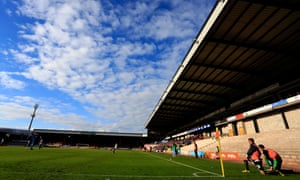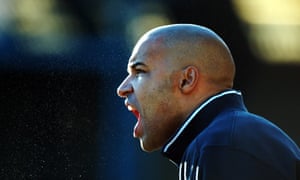
Bristol Rovers and Bristol City do not have much in the trophy cabinet.
Photograph: Tom Jenkins for the Guardian
“The beautiful city of Bristol has had two league clubs pretty much consistently since 1920, combining for a total of 212 years of league football, with only three Football League Trophies and one Welsh Cup to show for it,” mails Andy Field. “Does this make it the least successful multi-club city?”
Paul Levay thinks Stoke-on-Trent can challenge Bristol. “I admit that Bristol has a pretty rubbish record but Stoke-on-Trent is a competitor for the country’s most inglorious multi-club footballing city,” he says.
“Stoke City and Port Vale have very little to show from a joint total of about 290 years (with around 226 of those in the Football League). Since 1863, and as founder members of the Football League, Stoke have won one major trophy, the League Cup in 1972. They’ve also managed the Football League Trophy in 1992 and 2000.
“Stoke were second-tier champions in 1933 and 1963. They were third-tier champions in 1927 and 1993 and have one other promotion from that level. They were FA Cup runners-up in 2011 and got to the semi-finals in 1899, 1971 and 1972.
“Port Vale have been around since the late 1870s (1876 or 1879 depending on who you ask) but in that time they have won the grand total of two Football League Trophies, in 1993 and 2001.”

The greatest of escapes
“What was, statistically, the greatest great escape of them all?” asks Nick Jones. “Either in terms of the highest ‘points adrift’ to ‘points remaining’ ratio (perhaps not final-day escapes) or simply the largest ‘points adrift’ which was overcome. Without governing body interference, of course.”
Branislav Mihic reminds us of some surprising Danish survival. “Randers FC escaped relegation in the 2009-10 Danish Superliga, despite having only eight points after 18 games in the autumn half of the season,” he explains. “With the bottom two sides being relegated, they were 13 points off safety. However, in the spring half of the season (15 games), they were the best side in the league, collecting 32 points, and staying up at the expense of AGF, who were 19 points ahead at the winter break.”
Manager-player
“Gary Elphick started the season as Worthing manager, yet on Boxing Day he found himself taking them on as a Burgess Hill Town player,” tweets Matt Prior. “I wondered if this is a first in any way.”
Darrien Bold knows a thing or two about the topic. “Bury manager Andy Preece’s four-year spell in charge ended on 16 December 2003,” he points out. “He joined Carlisle United as a player three days later. On Boxing Day he returned to Gigg Lane and inspired Carlisle to a 3-1 win, setting up the second and third goals before going off to a standing ovation from both sets of supporters.”

Craig Kennedy remembers one of these very instances. “In 1988 the Dundee centre-half Jim Duffy had his career cruelly cut short at the age of 27, after suffering a knee injury in a match against Rangers. Duffy received a testimonial as a farewell to his playing career,” he remembers. “In September 1988 Duffy entered the Guiness Book of Records as Britain’s youngest manager, taking over at the (then) Division One team Falkirk. Fans were keen for Duffy to pull on the jersey and play for them, but he was insistent: his playing days were over, his knee was knackered.
“Duffy led Falkirk to the runner-up position in Division One, before leaving in October 1989. Duffy claimed that his departure was because of his disillusionment with footballers, after several of his Falkirk players were involved in a fracas outside a nightclub in Saltcoats. On leaving, Duffy was quoted as saying: “I love football and want to get back into it.”
“Falkirk fans were surprised to see Duffy appear in 1990 in a Dundee jersey, making eight appearances for his old club before transferring to Partick Thistle, where he appeared 72 times before moving back to Dundee in 1992 to play a further 108 times, quite often against Falkirk.”
Clubs’ strange sideline businesses (an update)
Justin Hughes has some fine knowledge to share. “A follow up answer to clubs that have a sideline business to stay afloat is Excelsior Rotterdam, presently in the Eredivisie,” he says. “In the 1960s and 1970s the club had an old paper-collection van which would drive around Rotterdam picking up used newspapers and other used paper to sell for recycling. As a result, Excelsior became known as ‘oud papier club’.”
Knowledge archive
“In 1999 while living in England I watched a TV programme about a fictional team which wins the FA Cup in the 1970s. Throughout the show they used footage of Sunderland’s FA Cup run in 1973. Does anyone remember the name of this show?” asked Peter Greaves.
“Bostock’s Cup!” screams Kevin Watts. “It was shown on ITV the night before the 1999 Champions League final and was absolutely hilarious, with parodies of Alan Shearer, Bob Paisley, Phil Neal, John Toshack, Malcolm Allison and many others. Shamefully overlooked and miles superior to the Mike Bassett film that turned up a couple of years later. There’s a few clips on YouTube, but it never got released on DVD. Personal favourite clip is the cup tie on the sloping pitch. Superb.”
It was indeed shown the night before the 1999 final, in a prime-time 9pm slot on ITV. You can watch some highlights here and here.
Can you help?
“We’ve heard of player-managers (Kenny Dalglish, Ruud Gullit, Nicolas Anelka). We’ve also heard of an owner-player (Rivaldo for Mogi Mirim). Are there any instances of owner-managers? Do the laws of the game prevent the owners from being first-team managers or assistant managers?” asks Kuch Bhi.
“Portsmouth’s Conor Chaplin has already played over 100 career games, with close to 100 league appearances despite not turning 21 until February,” writes Justin Anderson. “Who is the youngest player to have reached 100 appearances? What about landmarks such as 200 or 500?”
“In Fifa’s rules, a football can have an inflation pressure from 8.5 psi to 15.6 psi. Does the Premier League mandate a certain pressure throughout the league; or can the clubs suppling the balls have the choice of what pressure to inflate the game balls?” asks Stanley Kull.
